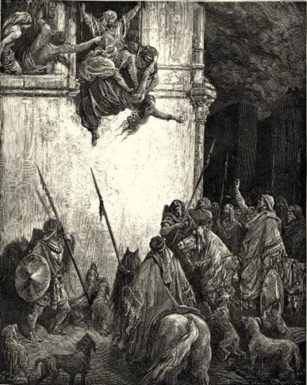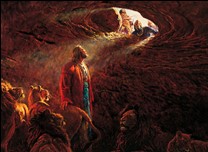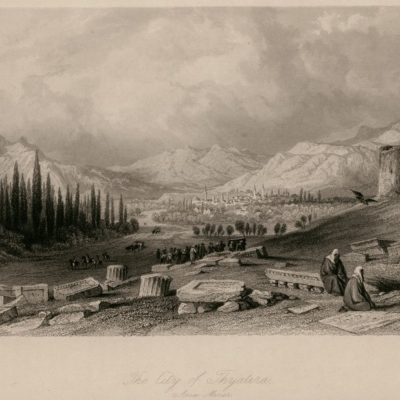Jezebel

The lessons we as women of Christ can learn from Jezebel is be loyal, to be dedicated to our worship of Christ. We need to be the power behind our families and be the spiritual guide to those Christ brings into our presents. Jezebel brought people of the LORD to worship baal. We need to bring those people the LORD brings to us toward a closer walk with Him. We need to demonstrate the same kind of tenacity and conviction to direct the Will and the Way of Christ to our families and those who are placed in our path.
1 Kings 16:29-34, 1 Kings 18:17-40, 1 Kings 19:1-3
Jezebel was the wife of Ahab, an impious and cruel queen who protected idolatry and persecuted the prophets. Her very name symbolizes a woman who pretended to be a prophetess, and whom, addicted to antinomianism (to any religious group believing they are not bound to obey the laws of their own religious tradition). Jezebel’s character is that she behaved like a Phoenician princess, not like an Israelite woman. She saw the monarch as having absolute power, and was contemptuous of the limitations that the old Hebrew Law put on her. Jezebel believed that the ruler of a kingdom made the law.
Jezebel was the daughter of Ethbaal king of the Zidonians. The Zidonians were inhabitants among the nations of Canaan. They served baal, and worshipped him. She had worshipped baal from childhood. She was brought up in a cultured and luxurious environment. Her people, the Phoenicians, were multicultural and educated and controlled large areas of the eastern Mediterranean.
Jezebel continued to worship baal when she married King Ahab. She tried to impose the worship of baal on the Israelites. King Ahab, in order to please Jezebel built a temple and an altar to baal in Samaria. This action provoked the LORD God of Israel to anger more than all the kings of Israel that were before him. (1 Kings 16:31-32).
The Israelites were living in a state of desperation because there was a terrible drought in Judah and Israel. The famine was killing the old and very young. Jezebel told the people to give up the LORD God and worship baal. There was a conflict between two religious beliefs; the worship of the LORD and the worship of baal that was being pushed and encouraged by Jezebel the queen of Israel.
There were four hundred fifty prophets of baal that ate at Jezebel’s table. (1 Kings 18:19). Jezebel killed all the prophets of the LORD God she could lay her hands on. The governor of their house was a God fearing man named Obadiah who hid a hundred prophets them by fifty in a cave, and fed them with bread and water. (1 Kings 18:1-32).
The prophet Elijah was sent to show himself unto Ahab. There was a famine in Samaria because of a lack of rain. Elijah built an altar in the name of the LORD at Mount Carmel. Elijah and the prophet of baal were in a contest for the people of the LORD. Gathered there were four hundred and fifty prophets of baal, and four hundred prophets of the groves which ate at Jezebel’s table and all the children of Israel. Then Elijah said to the people “I, even I only, am left a prophet of the Lord; but Baal’s prophets number four hundred and fifty. Let two bulls be given to us. Let them choose one bull for themselves, cut it in pieces, and lay it on the wood, but put no fire to it. I will prepare the other bull and lay it on the wood, but put no fire to it. Then you call on the name of your god and I will call on the name of the Lord. The god who answers by fire is indeed God.” All the people answered “Well spoken!” (1 Kings 18:17-40).
The children of Israel realized the LORD was indeed the LORD God of all gods. The people fell on their faces and once again worshipped the LORD. Elijah told them to take the prophets of baal and not let any escape. The prophets were brought down to the brook of Kishon and there they were killed. (1 Kings18:39-40). When Jezebel heard that the priests of baal had been murdered, she made a vow to avenge their deaths. (1Kings 19:1-3).
The worship of baal by the ordinary people was easy because they were a part of their daily existence and was visible in was just like everyone else. The visible gods were expressed as being the best and the worst in human nature. The worship of the LORD was harder for the people because they did not have faith in an invisible God. Jezebel did her job in keeping the conflict going. Her wickedness seemed to be never-ending.
Jezebel arranged for the death of a vineyard owner, Naboth, who would not sell his land to King Ahab. King Ahab wanted to build a temple to baal. When Naboth the Jezreelite refused to sell his land to the king; Ahab returned home sad and refused to eat. Jezebel told him she would get the land for him.
Jezebel wrote a letter in the name of Ahab and sent it to the elders and nobles of the city where Naboth lived proclaiming a fast. She sent two men to bear false witness against Naboth and they said he did not follow the fast and blaspheme God and the king. Naboth was stoned and died, his possessions and the vineyard was given to King Ahab. It was by the hand of Jezebel that Naboth and his sons were accused of treason on false made up evidence and was stoned to death and labeled a traitor. That made it easy for King Ahab to gain ownership of the vineyard. The LORD told King Ahab because he killed Naboth and took possession of the vineyard “In the place where dogs licked the blood of Naboth shall dogs lick thy blood, even thine.” (1 Kings 21:1-19).
Jezebel lived eleven years after the death of King Ahab. Ahab had fallen and died in his chariot. His blood seeped over the boards of the chariot floor, and when it was taken back to Samaria, some dogs licked at the blood before the chariot could be washed. 1 Kings 21:23 tell us that the LORD talked to Jezebel predicting her death saying “The dogs shall eat Jezebel by the wall of Jezreel.”
Jezebel and all the members of her family were killed during a coup d’etat led by Jehu. She died with courage, dressed royally as a queen and a priestess of baal. Jezebel died as a queen should die: magnificent and defiant, hurling insults at her murderers to the last moment of her life. (2 Kings 9:30-37).
Jezebel does not end with her death. Revelation condemns the church in Thyatira because they allowed the woman Jezebel, which called herself a prophetess, to teach and to seduce the servants of the LORD to commit fornication, and to eat things scarified unto idols (sacrificed to idols, the flesh left over from the heathen sacrifices). Fornication is to be given to idolatry, to worship idols or to permit one’s self to be drawn away by another into idolatry. (Strong 2001)
The sin of Jezebel was certainly more than fornication; it was toleration of idolatrous practices like eating food offered to idols and participation in the sexual orgies associated with pagan religion. So Jezebel was clearly a seductress that tempted the faithful to practice idolatry. (Yeatts, 2003).
Jezebel was given time to repent of her fornication and she refused to repent. Those who follow Jezebel will be cast into a bed of great tribulation until they repent of their deeds. The LORD will kill her children with death, and all the churches shall know that the LORD God searches the inmost thoughts, feelings and purposes of the soul and will give every one according to their works. (Revelation 2:18-24).
The attributes of Jezebel are very hard to find. She was loyal to her husband, the King and to her Phoenician upbringing to worship baal. She was strong-willed, courageous and loyal to her belief. She was successful in gaining whatever she wanted at any price. Jezebel and Ahab built a new capital city at Samaria and built a luxurious temple to baal and asherah. A second royal house was built near Jezreel. Their kingdom did prosper. Jezebel represents the power behind the throne, both political and spiritual.
The lessons we as women of Christ can learn from Jezebel is to equally be loyal, to be dedicated to our worship of Christ. We need to be the power behind our families and be the spiritual guide to those Christ brings into our presents. Jezebel brought people of the LORD to worship baal. We need to bring those people the LORD brings to us toward a closer walk with Him. We need to demonstrate the same kind of tenacity and conviction to direct the Will and the Way of Christ to our families and those who are placed in our path.
Reference:
Strong, James. The New Strong’s Expanded Exhaustive Concordance of the Bible. Nashville: Thomas Nelson Publishers, 2001.
Yeatts, John R. (2003). Revelation, Believers church Bible commentary. Scottdale, Pa.: Herald Press, pp. 368-69.
Cite Article Source
MLA Style Citation:
Holstein, Joanne “Jezebel:.” Becker Bible Studies Library Jan 2015.< https://guidedbiblestudies.com/?p=1851,>.
APA Style Citation:
Holstein, Joanne (2015, January) “Jezebel:.” Becker Bible Studies Library. Retrieved from https://guidedbiblestudies.com/?p=1851,.
Chicago Style Citation:
Holstein, Joanne (2015) “Jezebel:.” Becker Bible Studies Library (January), https://guidedbiblestudies.com/?p=1851, (accessed).


